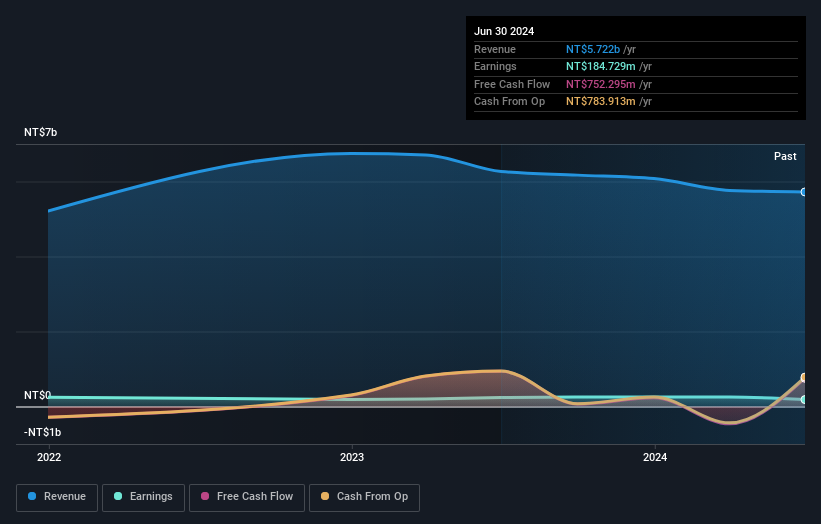- Taiwan
- /
- Tech Hardware
- /
- TWSE:6933
Insiders the biggest winners as Amax Holding Co., Ltd.'s (TWSE:6933) market cap rises to NT$9.5b

Key Insights
- Amax Holding's significant insider ownership suggests inherent interests in company's expansion
- 53% of the business is held by the top 4 shareholders
- Using data from company's past performance alongside ownership research, one can better assess the future performance of a company
A look at the shareholders of Amax Holding Co., Ltd. (TWSE:6933) can tell us which group is most powerful. The group holding the most number of shares in the company, around 44% to be precise, is individual insiders. That is, the group stands to benefit the most if the stock rises (or lose the most if there is a downturn).
As a result, insiders were the biggest beneficiaries of last week’s 13% gain.
Let's take a closer look to see what the different types of shareholders can tell us about Amax Holding.
Check out our latest analysis for Amax Holding

What Does The Lack Of Institutional Ownership Tell Us About Amax Holding?
We don't tend to see institutional investors holding stock of companies that are very risky, thinly traded, or very small. Though we do sometimes see large companies without institutions on the register, it's not particularly common.
There could be various reasons why no institutions own shares in a company. Typically, small, newly listed companies don't attract much attention from fund managers, because it would not be possible for large fund managers to build a meaningful position in the company. On the other hand, it's always possible that professional investors are avoiding a company because they don't think it's the best place for their money. Institutional investors may not find the historic growth of the business impressive, or there might be other factors at play. You can see the past revenue performance of Amax Holding, for yourself, below.

Amax Holding is not owned by hedge funds. Looking at our data, we can see that the largest shareholder is Jerry Shih with 17% of shares outstanding. With 13% and 12% of the shares outstanding respectively, Hsiao-Ching Shih and Jerry Kchine Shih are the second and third largest shareholders. Note that the second and third-largest shareholders are also Chief Executive Officer and Member of the Board of Directors, respectively, meaning that the company's top shareholders are insiders.
To make our study more interesting, we found that the top 4 shareholders control more than half of the company which implies that this group has considerable sway over the company's decision-making.
Researching institutional ownership is a good way to gauge and filter a stock's expected performance. The same can be achieved by studying analyst sentiments. As far as we can tell there isn't analyst coverage of the company, so it is probably flying under the radar.
Insider Ownership Of Amax Holding
The definition of company insiders can be subjective and does vary between jurisdictions. Our data reflects individual insiders, capturing board members at the very least. The company management answer to the board and the latter should represent the interests of shareholders. Notably, sometimes top-level managers are on the board themselves.
I generally consider insider ownership to be a good thing. However, on some occasions it makes it more difficult for other shareholders to hold the board accountable for decisions.
Our most recent data indicates that insiders own a reasonable proportion of Amax Holding Co., Ltd.. It has a market capitalization of just NT$9.5b, and insiders have NT$4.2b worth of shares in their own names. This may suggest that the founders still own a lot of shares. You can click here to see if they have been buying or selling.
General Public Ownership
With a 34% ownership, the general public, mostly comprising of individual investors, have some degree of sway over Amax Holding. While this size of ownership may not be enough to sway a policy decision in their favour, they can still make a collective impact on company policies.
Private Company Ownership
It seems that Private Companies own 11%, of the Amax Holding stock. It's hard to draw any conclusions from this fact alone, so its worth looking into who owns those private companies. Sometimes insiders or other related parties have an interest in shares in a public company through a separate private company.
Public Company Ownership
We can see that public companies hold 11% of the Amax Holding shares on issue. We can't be certain but it is quite possible this is a strategic stake. The businesses may be similar, or work together.
Next Steps:
It's always worth thinking about the different groups who own shares in a company. But to understand Amax Holding better, we need to consider many other factors. Take risks for example - Amax Holding has 1 warning sign we think you should be aware of.
Of course this may not be the best stock to buy. So take a peek at this free free list of interesting companies.
NB: Figures in this article are calculated using data from the last twelve months, which refer to the 12-month period ending on the last date of the month the financial statement is dated. This may not be consistent with full year annual report figures.
New: Manage All Your Stock Portfolios in One Place
We've created the ultimate portfolio companion for stock investors, and it's free.
• Connect an unlimited number of Portfolios and see your total in one currency
• Be alerted to new Warning Signs or Risks via email or mobile
• Track the Fair Value of your stocks
Have feedback on this article? Concerned about the content? Get in touch with us directly. Alternatively, email editorial-team (at) simplywallst.com.
This article by Simply Wall St is general in nature. We provide commentary based on historical data and analyst forecasts only using an unbiased methodology and our articles are not intended to be financial advice. It does not constitute a recommendation to buy or sell any stock, and does not take account of your objectives, or your financial situation. We aim to bring you long-term focused analysis driven by fundamental data. Note that our analysis may not factor in the latest price-sensitive company announcements or qualitative material. Simply Wall St has no position in any stocks mentioned.
About TWSE:6933
Amax Holding
Engages in the design and provision of advanced computing solutions.
Excellent balance sheet and slightly overvalued.
Similar Companies
Market Insights
Community Narratives




